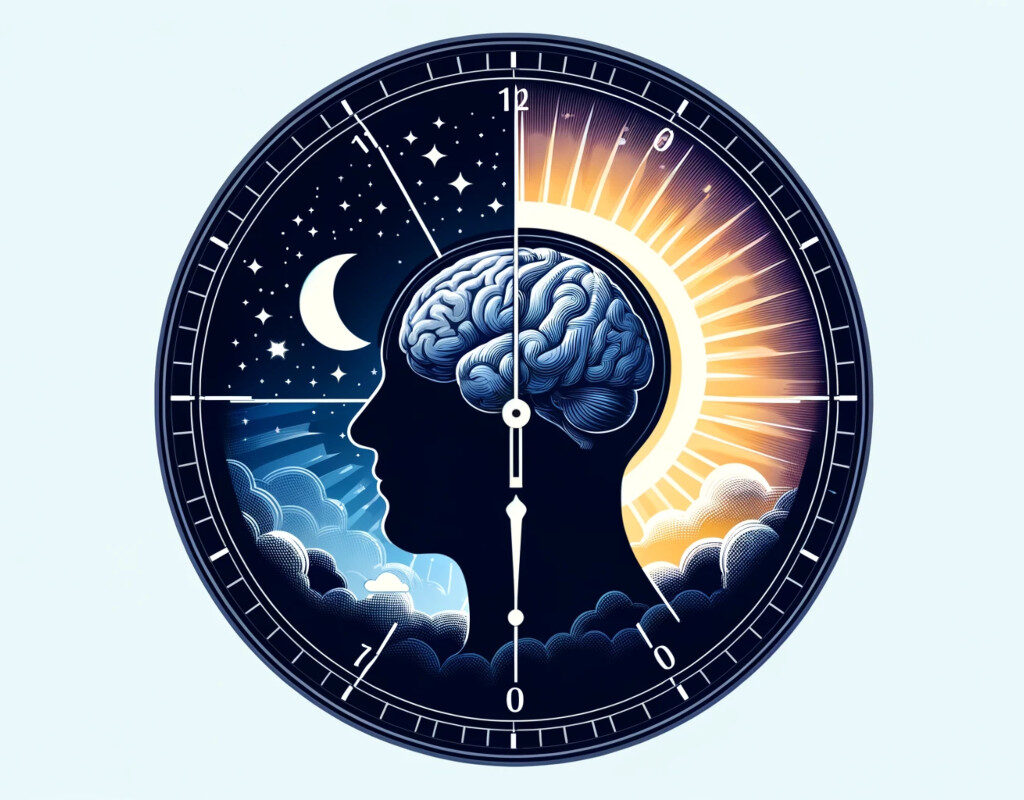Circadian rhythms, the 24-hour cycles that regulate our sleep-wake patterns, are essential in determining if we are morning people (larks) or night owls. These rhythms influence various aspects of our lives, from eating habits to career paths. We will explore how circadian rhythms affect different areas of our lives and how you can optimize your daily routine based on your chronotype.
Identify Your Chronotype and Circadian Rhythms: Are You a Lark or an Owl?
The classification into larks and owls is based on your activity and productivity levels throughout the day. However, there is a third group, the hummingbirds, who do not have a distinctly marked pattern. Although everyone can be classified into one of these chronotypes, there are variations within each group.
Morning People (Larks) and Night Owls
Your chronotype can significantly affect your life, including your personality, lifestyle and even health. Identifying your chronotype will help you understand your habits better and optimize your daily routine.
- Larks: Perform best in the morning, go to bed early and reach their peak performance around midday.
- Owls: Go to bed late and, if possible, sleep well into the morning. Their productivity peaks around 6 p.m. and they can continue being productive during the night.
While most people are hummingbirds with intermediate characteristics, knowing your specific chronotype can help you adapt your lifestyle to improve your well-being.
Social Skills and the Impact of Chronotype
Larks tend to stick to a plan and follow it, helping them avoid depression and stay focused. They have more self-control and a better ability to delay gratification. Morning people usually have a more positive attitude and feel happier and healthier.
On the other hand, owls can be more creative and impulsive, taking more risks. However, they tend to have higher rates of depression and mood disorders.
- Larks: Less likely to develop negative personality traits such as narcissism, Machiavellianism and psychopathy. Associated with greater happiness and daytime productivity.
- Owls: Creativity and impulsiveness, but higher incidence of mental health problems.
A study in the journal Learning and Individual Differences showed that owls develop cognitive skills more easily but have lower academic performance. In contrast, larks have better academic performance but lower cognitive ability.
Career Path and Chronotype
Chronotype can influence your career path. Larks tend to lead more conventional lifestyles and adapt better to traditional work hours, while owls lean towards the arts and entrepreneurial activities that allow them to work late.
- Larks: Favorable adaptation to morning work schedules, improving job performance and work relationships.
- Owls: Challenges in traditional work environments, which can lead to low self-esteem and dissatisfaction.
Nzinga Harrison, co-founder and Chief Medical Officer of Eleanor Health, an innovative mental health and addiction treatment company, suggests that larks have an advantage in the business world. A mismatch between chronotype and work schedule can negatively impact productivity and professional satisfaction.
Health and Circadian Rhythms
Circadian rhythms significantly influence health. Larks usually have faster circadian rhythms and better overall health, while owls face greater health challenges.
- Larks: Lower risk of sleep apnea, lower weight and greater stress resistance.
- Owls: Lower HDL cholesterol levels, higher cortisol (stress hormone) levels and higher incidence of ADHD and substance use.
Jo Lichten, also known as Dr. Jo, is a registered dietitian and nutritionist with a Ph.D. She is recognized for her work in health, nutrition and peak performance. She has written several books, including “Reboot—How to Power Up Your Energy, Focus and Productivity,” noting that owls tend to be more anxious and depressed, consume more caffeine and alcohol and have higher addiction rates.
In contrast, larks maintain focus throughout the day and have a higher level of life satisfaction.
Eating Habits and Chronotype
Chronotype affects our eating habits. Larks tend to have breakfast, lunch and dinner early, while owls prefer late-night snacks.
- Larks: Eat their main meals early, which can contribute to better metabolic health.
- Owls: Consume twice as many calories after 8 p.m., but leptin (the hunger hormone) is at its lowest, reducing the feeling of fullness.
Pam Peeke, senior scientific advisor for Elements Behavioral Health, explains that these differences can influence weight and overall health. Although science provides a lot of information about human behavior, each person is unique and may not fit perfectly into a single chronotype.
How Chronotype Affects Your Career
Chronotype can significantly influence your career. Larks tend to be more successful in conventional work environments due to their ability to adapt to early schedules. However, owls may face challenges if they work in companies where they are expected to be active early in the morning.
- Larks: Better performance in morning jobs, higher job satisfaction.
- Owls: Difficulties in traditional jobs, higher risk of fatigue and self-esteem issues.
Adapting your career to your chronotype can improve your well-being and productivity. For example, owls can thrive in jobs that allow flexible hours or night work.
Circadian Rhythms: A Guide to a Fuller Life
Knowing and understanding your chronotype is essential to optimize your daily life. Circadian rhythms influence our health, eating habits, social skills and career path. Identifying whether you are a lark or an owl can help you adjust your daily routine to improve your overall well-being.
Remember, although chronotype can influence many aspects of your life, each person is unique. It is important to consider your own needs and circumstances when adapting your routine. Use the knowledge about circadian rhythms to enhance your quality of life and achieve greater personal and professional satisfaction.
Identifying your chronotype and understanding how circadian rhythms affect your daily life is key to improving your well-being. From eating habits to career paths, your chronotype influences many aspects of your life. By adjusting your routine according to your circadian rhythm, you can increase your productivity and health. While it’s essential to consider your personal circumstances, using this knowledge will help you achieve greater satisfaction and balance in your life.





